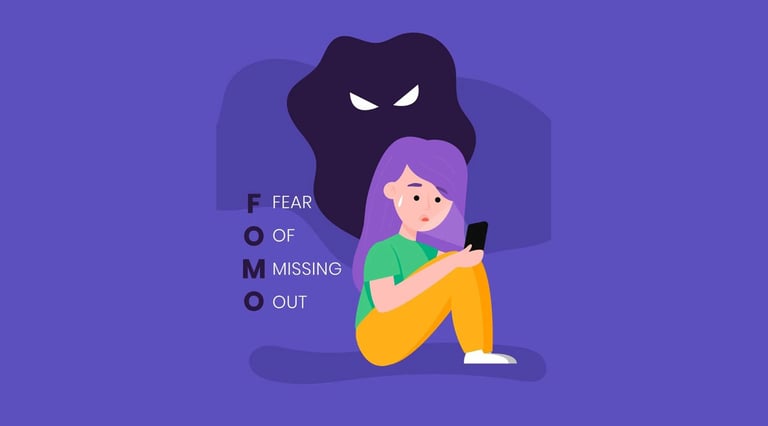FOMO: Fear of Missing Out
Learn why FOMO sabotages trading. How impulsiveness and illusion of opportunity tricks you into "this is the last chance" derailing you to overtrading.
TRADING PSYCHOLOGY
Ivan Gener
9/3/20253 min read


FOMO, short for “Fear of Missing Out”, is the anxious feeling that you might miss a profitable opportunity or that others are gaining something you’re not.
In trading, FOMO often shows up as chasing a move after it’s already taken off, entering trades without a plan, or overtrading because you don’t want to “miss the big one.” It’s driven by emotions—mainly fear, impatience, and comparison—rather than logic or strategy.
1. Why FOMO sabotages trading
Impulse > Plan. FOMO makes you jump into trades without waiting for confirmations, often chasing price after a big move.
Illusion of opportunity. It tricks you into believing “this is the last chance,” when in reality the market provides endless setups every day.
Overtrading. Leads to taking more trades than planned, increasing commissions, spreads, and risk exposure.
Loss of consistency. You break your trading rules, which damages confidence long term.
2. The deeper layer: scarcity mindset & childhood
FOMO usually links to:
Scarcity conditioning. Growing up feeling that “if I don’t grab it now, I’ll never get another chance.”
Comparison. Seeing others succeed and thinking you’re “behind” creates a rush to catch up.
Validation need. Taking trades equals action; not taking trades feels like “doing nothing” (which perfectionists hate).
Healing requires:
Shifting from scarcity → abundance.
Accepting that waiting is a valid and professional trading action.
3. Long-term mindset shift
The market is infinite. You don’t need every trade — you need the right trades.
The pros don’t catch every move. They’re fine missing plenty, because they know: capital + patience = survival = profits.
4. Reframing FOMO
Think of missed trades as:
Proof of abundance. If you missed it, it means your strategy works — the market gave the setup, you just weren’t in it. Another will come.
Capital protection. Every trade you don’t take saves you from potential losses. Not entering is also a successful decision.
A win for patience. Skipping a trade = reinforcing discipline. That’s building the muscle that separates professionals from gamblers.
👉 “Missing one move does not cost me my career. Breaking my rules does.”
5. Practices to reduce FOMO
(a) Missed Trade Journal
Each time you feel FOMO, write:
What trade I felt like chasing.
Why I didn’t take it.
What I learned from observing it instead of jumping in.
Purpose: show your brain that not trading is also valuable.
(b) Abundance Affirmation
Before every session:
👉 “The market will give me unlimited opportunities. I only need one or two high-quality trades. Missing is not losing.”
(c) Observation Practice (Demo or Replay)
Open a chart replay. When you see a move you would normally chase, intentionally don’t take it.
Sit with the discomfort.
Practice being okay with watching price run away.
Goal: desensitize yourself to the panic of missing.
(d) Breath Anchor for Urges
When you feel the urge to click impulsively:
5 slow breaths (inhale 4s, exhale 6s).
During each exhale, repeat: “Patience pays me. Impulse costs me.”
Try it our for one week and send us a message about your experience. We'd love to hear it!
✅ Action Plan: 1-Week Anti-FOMO Challenge
Write down every FOMO urge in your journal (don’t act on it).
Use the Abundance Affirmation daily before trading.
Practice intentionally missing at least 1 setup per day.
Review at week’s end: how many urges did you resist? How much capital did you save?
⚡ Why this works:
You train patience as a skill. Like a muscle, every resisted urge strengthens your discipline.
You rewire scarcity into abundance. By journaling missed trades and repeating affirmations, your nervous system starts believing: “opportunities are infinite, I don’t need to rush.”
You build self-trust. Each time you skip a FOMO entry and stick to your rules, you reinforce the identity of a professional trader who chooses quality over quantity.
You separate action from worth. Waiting becomes a decision equal in value to taking a trade — which removes the pressure to “always be in the market.”
Oneself: A Journey to Yourself
Explore your inner self and enhance your trading.
© 2025 Oneselft. All rights reserved.
Legal
